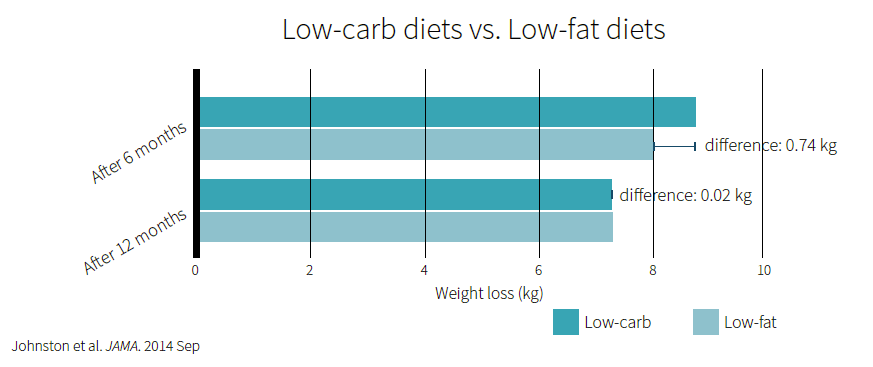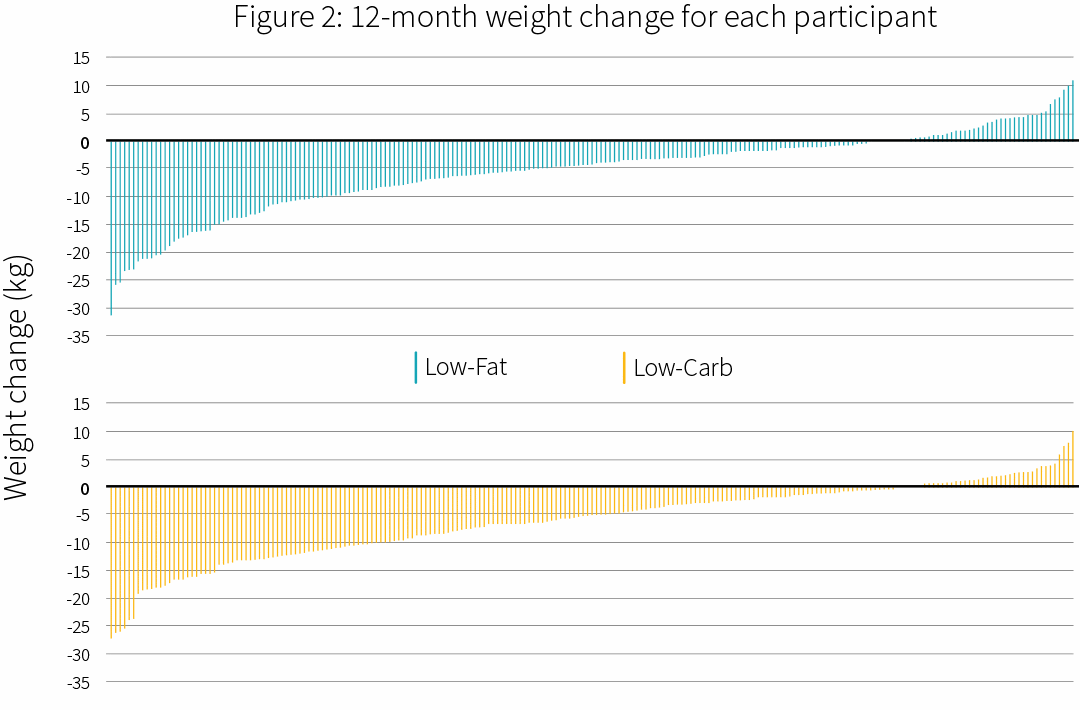Whether you gain or lose weight depends on your total caloric intake, rather than on your macronutrient ratios. That said, there are reasons why, in theory, eating fat is more likely to make you fat. We’ll review those reasons, then we’ll see if the evidence supports the weight-loss superiority of low-fat diets.
The case against dietary fat
Dietary fat is the macronutrient that can most easily increase your body fat: the two types of fat are essentially the same, so making the former into the latter is easy for your body. Dietary fat has a TEF of just 0–3% (of the three macronutrients, it requires the least energy to digest, relative to the energy it provides),[1] and it gets stored with 90–95% efficiency (compared to 75–85% efficiency for carbs).[2]
- When you eat carbs, your body can, in order of priority, burn them for energy, store them as glycogen, burn them off as heat, or, as its very last choice, turn them into fat.[3][4][5] So if you overeat with carbs as your main source of calories, the excess might not translate as fat gain.
- When you eat protein, your body can, in order of priority, use it for protein synthesis and many other metabolic purposes, burn it for energy, or, rarely, turn it into glucose or fat. So, again, if you overeat with protein as your main source of calories, the excess might not translate as fat gain.
- When you eat fat, however, your body has only two options: burn it for energy, if neither carbohydrate nor excess protein is available, or store it as body fat. If you overeat with fat as your main source of calories, even for just one day, the excess translates as fat gain.[2]
Since your body will burn carbs and even excess protein before it burns fat,[6] how much fat you eat won’t substantially affect how much carbs or protein you burn,[7][8] but how much fat you burn will depend on how much carbs (and, to a lesser extent, protein) you eat.[9] To put it another way, how much carbs and protein you eat will affect your total caloric intake, and if you consume more calories than you burn, then all the excess dietary fat gets stored.[10][4][11]
Another problem with fat is its caloric density: 9 Calories per gram, versus 4 for protein and carbs. Just as their low caloric density makes high-fiber, high-water foods satiating, fat’s high caloric density makes it less satiating.[12][13][14]
Of course, the satiating effect of a given food doesn’t depend only on its macronutrient content, and different foods affect different people differently. In other words, if you find certain high-fat foods satiating, it doesn’t mean you’re weird or the science is wrong; it just means that human trials cannot test every possible variable.
Dietary fat is more calorie-dense and, as a rule, less satiating than protein or carbs. Your body finds it easy to digest and store as body fat.
The lowdown on low-fat diets
Considering all we’ve said so far, you could be excused for thinking that, when the goal is weight loss, a low-fat diet is the way to go. Yet, in practice, the evidence is mixed. For each human trial that reports greater weight loss from low-fat,[15] there seems to be one that reports greater weight loss from low-carb.[16]
The best trial to date lasted 12 months: called DIETFITS, it found that a healthy low-carb diet and a healthy low-fat diet led to similar weight changes. Further, it noted that “neither genotype pattern nor baseline insulin secretion was associated with the dietary effects on weight loss”.[17]
It is important to note that, like other studies,[18][19] DIETFITS found the weight-loss difference between the low-carb group and the low-fat group to be very small compared to the weight-loss variations within a same group. In other words, interindividual differences seem to matter more than the diet being low-fat or low-carb.

In fact, when compiling the data, we realize that low-fat or low-carb may not even matter at all in the long run. Whereas a 2015 meta-analysis of diet trials reported modestly greater weight loss from low-carb diets,[20] a meta-analysis of diet trials published the year before had found that, after a year, low-carb and low-fat diets balanced out:[21]

Now, these studies all give us great information on the real-world effects of low-fat and low-carb diets, but they have their limitations: food intake was not controlled and diets were self-reported. Also, in some of them, there were differences in energy and protein intake between groups, making it impossible to isolate the fat and carb contributions to the findings.
Therefore, it is notable that a meta-analysis of 32 studies whose participants were fed by the researchers (thus ensuring that, within each study, each diet had different amounts of fat and carbs but the same amount of protein and calories) reported that low-fat diets resulted in greater energy expenditure (by an average of 26 Calories per day) and greater fat loss (by an average of 16 grams per day).[22] The diets varied widely in carbs (1–83% of calories) and fat (4–84% of calories — so yes, ketogenic diets were included).
An extra 16 grams of fat loss per day amounts to about a pound of fat each month, so 12 pounds a year. But don’t declare victory for low-fat yet — these were highly controlled feeding studies, and real life isn’t highly controlled. In the real world, some people will lose more weight on a low-carb diet, due to factors such as limiting junk food choices and encouraging higher protein intake.
Low-fat and low-carb diets produce similar weight-loss results, at least in long-term clinical trials. Both types of diet work mostly because the trials’ participants reduce their intake of calories, not just of carbs or fat, and because eating less carbohydrate or fat usually results in eating more protein.
If you wish to lose fat, dieting comes first, exercise second.[23] No supplement will replace either, but some supplements can make both more efficient. To learn which supplements are backed by the evidence and how to take them (when, in what dosages, and in what combinations), read our constantly updated Fat Loss Supplement Guide.
